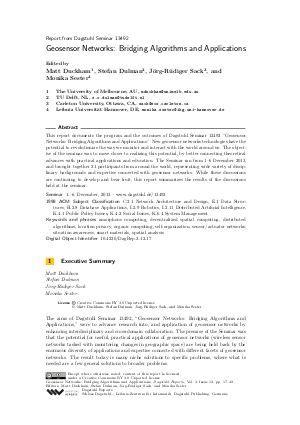Geosensor Networks: Bridging Algorithms and Applications (Dagstuhl Seminar 13492)
Authors Matt Duckham, Stefan Dulman, Jörg-Rüdiger Sack, Monika Sester and all authors of the abstracts in this report
-
Part of:
Issue:
Dagstuhl Reports, Volume 3, Issue 12
Part of: Volume: Dagstuhl Reports, Volume 3
Part of: Journal: Dagstuhl Reports (DagRep) - License:
 Creative Commons Attribution 3.0 Unported license
Creative Commons Attribution 3.0 Unported license
- Publication Date: 2014-03-18
File

PDF
DagRep.3.12.17.pdf
- Filesize: 0.85 MB
- 26 pages
Document Identifiers
Subject Classification
Keywords
- amorphous computing
- decentralized spatial computing
- distributed algorithms
- location privacy
- organic computing
- self-organization
- sensor/actuator networks
- situation awareness
- smart materials
- spatial analysis
Metrics
- Access Statistics
-
Total Accesses (updated on a weekly basis)
0Document
0Metadata
Abstract
This report documents the program and the outcomes of Dagstuhl Seminar 13492 "Geosensor Networks: Bridging Algorithms and Applications." New geosensor networks technologies have the potential to revolutionize the way we monitor and interact with the world around us. The objective of the seminar was to move closer to realizing this potential, by better connecting theoretical advances with practical applications and education. The Seminar ran from 1--6 December 2013, and brought together 21 participants from around the world, representing wide variety of disciplinary backgrounds and expertise connected with geosensor networks. While these discussions are continuing to develop and bear fruit, this report summarizes the results of the discussions held at the seminar.
Cite As Get BibTex
Matt Duckham, Stefan Dulman, Jörg-Rüdiger Sack, and Monika Sester. Geosensor Networks: Bridging Algorithms and Applications (Dagstuhl Seminar 13492). In Dagstuhl Reports, Volume 3, Issue 12, pp. 17-42, Schloss Dagstuhl – Leibniz-Zentrum für Informatik (2014)
https://doi.org/10.4230/DagRep.3.12.17
BibTex
@Article{duckham_et_al:DagRep.3.12.17,
author = {Duckham, Matt and Dulman, Stefan and Sack, J\"{o}rg-R\"{u}diger and Sester, Monika},
title = {{Geosensor Networks: Bridging Algorithms and Applications (Dagstuhl Seminar 13492)}},
pages = {17--42},
journal = {Dagstuhl Reports},
ISSN = {2192-5283},
year = {2014},
volume = {3},
number = {12},
editor = {Duckham, Matt and Dulman, Stefan and Sack, J\"{o}rg-R\"{u}diger and Sester, Monika},
publisher = {Schloss Dagstuhl -- Leibniz-Zentrum f{\"u}r Informatik},
address = {Dagstuhl, Germany},
URL = {https://drops.dagstuhl.de/entities/document/10.4230/DagRep.3.12.17},
URN = {urn:nbn:de:0030-drops-45060},
doi = {10.4230/DagRep.3.12.17},
annote = {Keywords: amorphous computing, decentralized spatial computing, distributed algorithms, location privacy, organic computing, self-organization, sensor/actuator networks, situation awareness, smart materials, spatial analysis}
}
